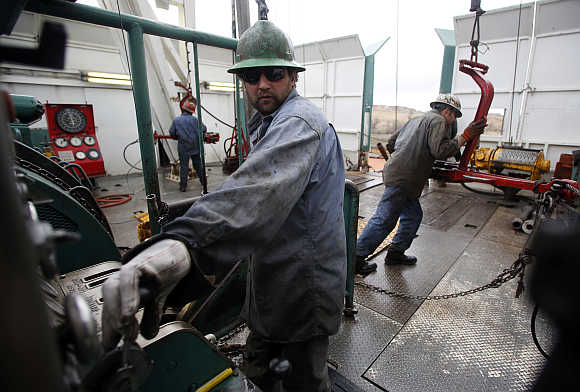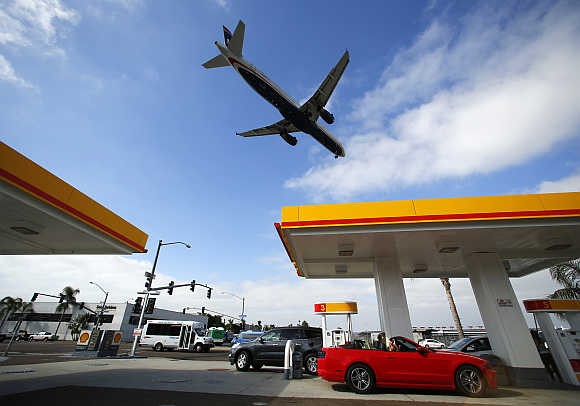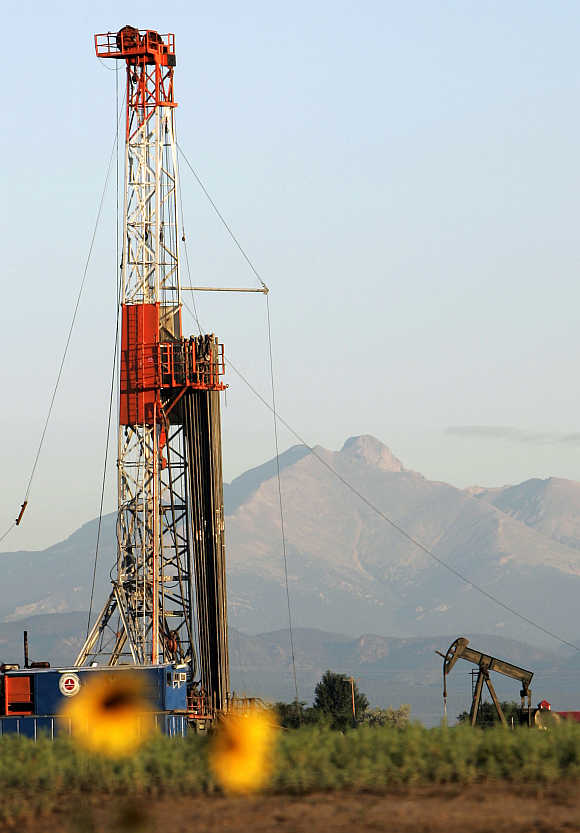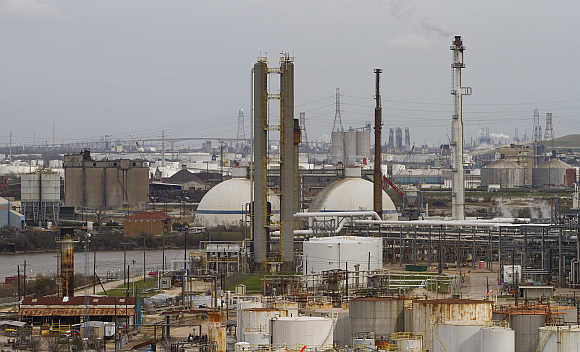Photographs: Lucas Jackson/Reuters Nitin Pai
The United States' declinism industry peaked around four years ago. Dire predictions were made in Washington - and lapped up enthusiastically around the world, not least in New Delhi - about the post-American world.
A few wise heads advised caution, reminding another generation that like every industry, American declinism goes through cycles. Neither the Soviets nor Japan had, after all, overtaken the US as once believed.
For those watching their Bloomberg screens in horror or Barack Obama's first presidential campaign in awe, it was hard to latch on to arguments that suggested that things might actually turn out okay for the US. Despite the reality of the fiscal cliff, the US declinism industry is beginning to bottom out now.
...
United States set to become the new oil power
Image: Mike Wipf operates the drill on a True Company oil drilling rig outside Watford, North Dakota.Photographs: Jim Urquhart/Reuters
Last week, the International Energy Agency's "World Energy Outlook" 2012 report drew attention to a development that had become increasingly apparent over the last year: "United States becomes a net exporter of natural gas by 2020 and is almost self-sufficient in energy, in net terms, by 2035."
It is projected to produce more oil than Saudi Arabia in 10 years and become a net oil exporter around 2030. In fact, Philip Verleger, an energy expert and visiting fellow at the Peterson Institute for International Economics, estimates that the US will be energy independent as early as 2023.
...
United States set to become the new oil power
Image: An oil drilling rig operates near homes and farm fields outside Williston, North Dakota.Photographs: Jim Urquhart/Reuters
In the Spring 2012 edition of The International Economy, Verleger argues that the US arrived at what he calls the "low-cost clean path to energy independence" by accident.
"By luck ... the United States is beginning to reap the benefits of large, low-cost supplies of clean natural gas. By luck, the firms developing these resources were able to take advantage of new financial instruments created by Wall Street, instruments that let them continue expanding even when prices collapsed.
"By luck, the United States is profiting from dramatic increases in auto fuel economy, a change that came after the 2008 gasoline price surge and GM and Chrysler's subsequent bankruptcies. By luck, the United States is also benefiting from technological advances that make lower-cost shale oil production possible."
...
United States set to become the new oil power
Image: Consumers buy petrol as a plane approaches to land at the airport in San Diego, California.Photographs: Mike Blake/Reuters
The path towards energy independence is obviously good news for the US economy. It stands to benefit in many ways, starting from creating jobs in the energy sector and in energy-intensive manufacturing in the near term, to taking some pressure off its trade deficit.
What is more remarkable is just how the US got here. Its "luck" lies not in digging a hole in the desert and striking oil. Rather, it arises from an environment of innovation, entrepreneurship, markets and economic freedom that permitted the luckiness that Verleger identifies.
Some of the very qualities that create excesses, bubbles and crises are the ones that help the US overcome them. Whatever value judgement we might place on this, it is extremely difficult for other countries to generate on their own. In simple words: don't write off the US.
...
United States set to become the new oil power
Image: New oil well is drilled near Dacono, Colorado.Photographs: Rick Wilking/Reuters
The geopolitical impact of the US' energy trajectory, less its consequences, will only be understood over time. We can, however, identify the big factors that are of immediate concern to India. First, the purpose of Washington's policy towards West Asia will continue its shift from securing its oil supplies to managing the stability of the supplying region.
The Gulf today accounts for only around 12 per cent of US oil imports. As this declines even further, Washington will be less beholden to the interests of its oil-supplying allies.
However, because stability of the Gulf will affect international energy prices, the US will have a continued interest in remaining engaged in the region. The US Navy's Fifth Fleet is not going away.
...
United States set to become the new oil power
Image: A cyclists rides past a gas station in San Diego, California.Photographs: Mike Blake/Reuters
Second, China, Japan and India will both be expected to and see a need to invest in the stability and security of West Asia. It remains to be seen how the Asian powers will undertake this enterprise.
There are incentives for co-operation, as stable supplies of oil and gas are in their common interest. There is also scope for competition, and the temptation for exclusive deals and supply lock-ins will play out amid many conflicts of West Asia.
Third, India, unlike China, will not be able to easily secure oil and gas through international pipelines. This is a disadvantage only in a world where all supplies are locked in pipelines and long-term contracts.
...
United States set to become the new oil power
Image: An oil refinery and storage facility south of downtown Houston.Photographs: Richard Carson/Reuters
New Delhi's energy diplomacy must emphasise making international energy markets more competitive. It is in India's interests to weaken existing supply cartels in oil and nuclear resources, and prevent new ones from forming in gas and perhaps even coal.
In terms of both energy supplies and the technology to extract it, the US has what India needs the most. The two countries are also strategic partners. Sitting in a railway carriage reading the IEA report, I turned to Aruna Urs, the colleague seated next to me, and asked how might we persuade the Americans to share their most advanced technologies with us.
...
United States set to become the new oil power
Image: A motorist pumps fuel into her vehicle in Phoenix, Arizona.Photographs: Joshua Lott/Reuters
"Nothing better than a bilateral free trade agreement," came the reply. He has a point.
The writer is fellow and founder for geopolitics at the Takshashila Institution, an independent public policy think tank










article